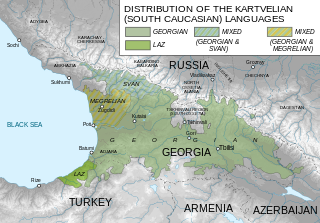
Lanchkhuti is a city in western Georgian region of Guria. It has a population of about 8000.
The 1990 Soviet Top League season was the 53rd since its establishment. Spartak Moscow were the defending 12-times champions. The league was shortened and a total of fourteen teams participated. By the start of the season both Georgian teams have withdrew followed by another withdrawal from Žalgiris at the start of competition. The league consisted of ten teams contested in the 1989 season and the Army club promoted from the Soviet First League. The representatives of the Baltic states as well as Georgia chose not to take part in the competition.
The House of Vardanisdze was an aristocratic family in medieval Georgia, listed among the Great Nobles (didebuli) of the realm.

The Principality of Guria was a historical state in Georgia. Centered on modern-day Guria, a southwestern region in Georgia, it was located between the Black Sea and Lesser Caucasus, and was ruled by a succession of twenty-two princes of the House of Gurieli from the 1460s to 1829. The principality emerged during the process of fragmentation of a unified Kingdom of Georgia. Its boundaries fluctuated in the course of permanent conflicts with neighboring Georgian rulers and Ottoman Empire, and the principality enjoyed various degrees of autonomy until being annexed by Imperial Russia in 1829.

The House of Gurieli was a Georgian princely (mtavari) family and a ruling dynasty (dukes) of the southwestern Georgian province of Guria, which was autonomous and later, for a few centuries, independent. A few ducal rulers of the dynasty also rose in the 17th-18th centuries to be kings of the whole western Caucasus in place of the hereditary Bagrationi kings of Imereti.
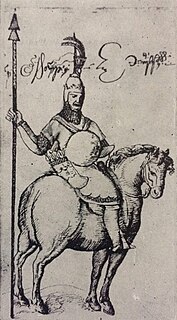
Mamia III Gurieli, also known as Mamia the Great Gurieli or the Black Gurieli, of the western Georgian House of Gurieli, was Prince of Guria from 1689 to 1714. Involved in civil wars plaguing western Georgia, he became King of Imereti three times in the years of 1701, 1711–1712, and 1713–1714. After his first reign as king for a year in 1701, he abdicated the throne of Imereti, being unable to tolerate the influence of his father-in-law Giorgi Abashidze. Subsequent periods of his royal career was the result of a feud with Giorgi VII of Imereti. Mamia died while still sitting on the throne of Imereti, which then reverted to his rival Giorgi VII.
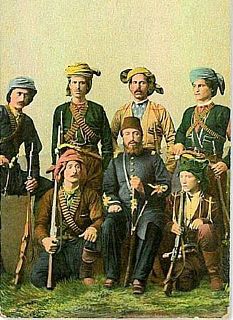
The Tavdgiridze is a Georgian noble family, known since the 14th century. They hailed from the southern provinces of Georgia which fell under the Ottoman rule in the 16th century. This forced many of the Tavdgiridze to relocate to relatively safer areas such as Kartli, Imereti, and Guria. In the latter province, in the 17th century, the family was bestowed by the local ruling prince Giorgi III Gurieli with an estate in Lower Guria and the hereditary office of Chief Bailiff (bok’auli). The Ottoman expansion into Lower Guria in the 1770s divided the Tavdgiridze family along religious lines. Mamuka Tavdgiridze and his household fled the Ottomans in the north of Guria. His Christian descendants received among the princely nobility of the Russian Empire in 1850. One of Mamuka’s sons, Maxime, became Muslim, adopted the name of Süleyman and was conferred by the Ottoman government with the sanjak of Çürüksu (Kobuleti). His descendants remained loyal local rulers to the Ottoman Empire, fighting the Russians in the wars of 1853-6 and 1877-8. One of these, Hasan-Bey was killed in 1854, while Ali-Paşa and Osman-Paşa had to resettle to Turkey as muhajirs in 1878. Hasan and Ali are satirized in local folk songs of Guria.
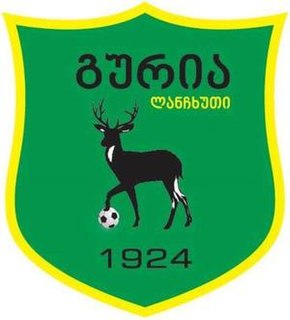
FC Guria Lanchkhuti is a Georgian association football club. The club finished second in the 1990 and 1991 Umaglesi Liga. Before 1960 the club was named Kolmeurne Lanchkhuti, K.I.M.I. They currently play in Erovnuli Liga 2, the second division of Georgian football.
The Nakashidze is a noble family in Georgia, one of the princely houses hailing from the province of Guria. In the Principality of Guria, they held the hereditary office of Receivers of Ambassadors, as well as the bailiffship (mouravi) of Shemokmedi, Ozurgeti, and Chochkhati. After the Russian annexation of Guria (1828), the family was received among the princely nobility of the Russian Empire. The family produced several military figures and bureaucrats in the Imperial Russian service into the 20th century.
Guriis Eristavi or Eristavi of Guria, was a Georgian noble family, a branch of the Shervashidze, dynasts in Abkhazia. Their surname derives from the title of eristavi ("duke") the family held under the suzerainty of the reigning princes of Guria in southwest Georgia. In the 18th century the family bore the name Eristavi-Sharvashidze (ერისთავი-შერვაშიძე). In 1850, the family was received among the princely nobility of the Russian Empire as knyaz Eristov-Guriisky.
The Ujmajuridze is a Georgian family name from the Guria region in western Georgia.
The Esadze is a Georgian family name from the Guria region in western Georgia.
The Tugushi is a Georgian family name from the Guria region in western Georgia.
The 2012–13 Georgian Cup is the sixty-ninth season overall and the twenty-third since independence of the Georgian annual football tournament. The competition began on 29 August 2012 and will end with the final in May 2013. The defending champions are Dila Gori, after winning their first ever Georgian Cup last season. The winner of the competition will qualify for the second qualifying round of the 2013–14 UEFA Europa League.
Mgeladze is a Georgian noble family. In Georgian it literally means "son of a wolf".
The larchemi or soinari is an ancient Georgian musical instrument of the panpipe family. It is known as "larchemi" in Samegrelo and "soinari" in Guria, but there is no difference in the instrument; those in Guria may be smaller. The larchemi was in the past found also in Abkhazia, Imereti and Lazeti. By 1958, when it was studied by Kakhi Rosebashvili, it had largely disappeared.
Bediani was a medieval title, or a territorial epithet, of the Dadiani, the ruling family of Mingrelia in western Georgia, derived from the canton of Bedia, in Abkhazia, and in use from the end of the 12th century into the 15th. Bediani was occasionally used as a praenomen. The extent of the fief of Bedia is difficult to define; by the latter half of the 17th century, the Shervashidze of Abkhazia had supplanted the Dadiani in that area.
The 2015–16 Umaglesi Liga was the 27th season of top-tier football in Georgia. Dila Gori were the defending champions. The season began on 13 August 2015 and ended on 22 May 2016. It was a last season with a autumn-spring schedule before the changes of competition format to spring-autumn schedule from 2017 season.
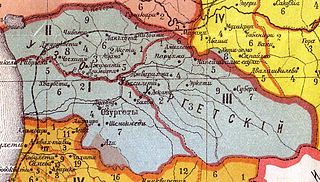
The Ozurget Uyezd was an uyezd (county) of the Kutais Governorate of the Caucasus Viceroyalty of the Russian Empire. It roughly corresponds to modern-day Guria. It was created in 1846 and lasted until the formation of the Democratic Republic of Georgia in 1918, when the historic name Guria was restored.
